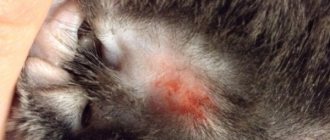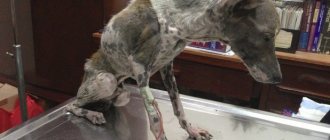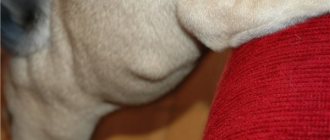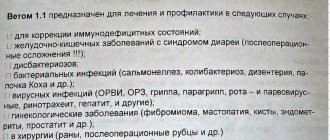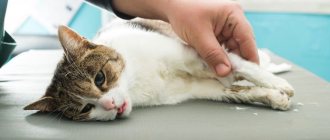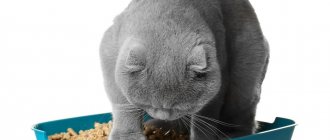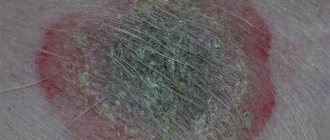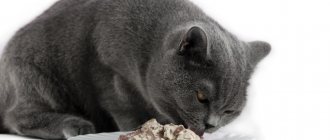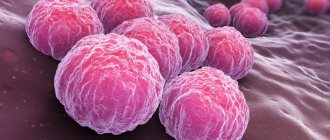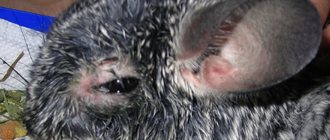Reasons why gastritis develops in cats
Various factors contribute to the development of feline gastritis. This may be a primary disease caused by poor diet. But it also develops against the background of another pathology in the form of a complication, despite proper care and quality of food.
Gastritis in cats
A sudden change in diet
Cats find it painful to switch to a new diet. Especially if good store-bought food is replaced by low-quality food (table waste, meat scraps, etc.). But my stomach is not used to such food. Until the production of new enzymes improves, inflammation will occur.
Incorrect feed supply
Hot or cold food can provoke irritation of the mucous membrane. The destructive effect increases if the cat quickly absorbs food. People also “sin” by treating the cat to meat and fish dishes that contain salt, spices, and onions from the common table. These ingredients are unacceptable for a cat's stomach.
You also need to monitor the quality of food, be it meat and fish or special food for cats. Some owners feed their cats meat or fish waste of dubious quality. Often these products are not the freshest.
Overfeeding
Many owners rush to feed their pet on demand. Many breeds have a genetic predisposition to excess weight, and at home the risk doubles. Due to the large volume of food, gastric juice does not have time to be produced, and digestion is disrupted. The walls of the stomach stretch, and the inflammatory process begins.
Systematic overfeeding and improper eating are the main causes of feline gastritis
Other reasons
Other factors that provoke inflammation of the gastric mucosa:
- poisoning with toxic substances;
- infectious diseases;
- worms;
- systematic ingestion of wool;
- diseases of the teeth and oral cavity;
- taking medications.
Reference! A cat may develop gastritis after antibiotics as a reaction to decreased immunity.
Symptoms
The symptoms of gastritis in cats are varied, but it’s not easy to ignore them. If you monitor the health of your four-legged friend, then you will notice in time that your pet is not feeling well.
Appetite changes
The pet eats reluctantly and little - this is, perhaps,... This can be explained by the fact that the gastric mucosa is inflamed, so eating becomes painful. Who wants to do something that causes discomfort and pain? In addition, the animal hurts when its tummy is touched. Therefore, the cat is unlikely to be willing to go into your arms.
Other symptoms
Other symptoms of gastritis in cats:
| Lethargy | Where would we be without her? If a cat has gastritis, it will spend more time lying down. |
| Bad breath | However, not always. Odor can also be a symptom of oral diseases (caries, for example). |
| Coated tongue | If you look closely, you will notice a coating on the root of the tongue (sometimes the entire tongue). But you should understand that sometimes plaque appears due to a sore throat. In any case, if you notice a coated tongue, it is better to go to the veterinarian. |
| Rumbling | This is a serious symptom that sometimes indicates an infectious disease! Sometimes helminths lead to a similar rebellion. But remember that rumbling is not the norm. |
| Either constipation or diarrhea | But the remains of undigested food are visible in the stool. If your pet cannot go into the litter tray normally, this already indicates problems with digestion. Diagnostics required. |
| Vomit | Especially if it is yellow and there is foam. There may be pieces of undigested food. But this is not a clear sign that the cat has gastritis. Vomiting may be a symptom of another disease. |
| The animal is losing a lot of weight | This can be easily explained by the fact that there is no appetite, and even if something is eaten, most of the food comes out. |
| The fur becomes dull and falls out | Long-haired dogs may develop mats. |
| The mucous membranes acquire a yellowish tint | But in addition to the symptom of gastritis, this may be a sign of more serious liver problems. In any case, contact your veterinarian to rule out infectious and parasitic diseases. |
If you find several of these symptoms of gastritis in cats at once, then you need to start treatment immediately!
Form of the disease and symptoms
Rhinotracheitis in cats: symptoms and treatment at home
Gastritis in cats occurs in different forms. It can develop suddenly, or it can last for years in a chronic form.
Chronic form
Characterized by a violation of the production of gastric juice (deficiency or excess). In most cases it is asymptomatic. Occasionally, the animal vomits, which is attributed to the stomach being clogged with hair. Lack of treatment leads to fragility of blood vessels, which can lead to hemorrhage in the stomach.
Acute form
In case of acute gastritis in a cat, the symptoms are vivid, treatment should be started as quickly as possible. The mucous membrane swells, inflammation begins. The first sign is loss of appetite, stool upset, vomiting, lethargy and apathy. As the disease progresses, a putrid odor appears from the mouth, a yellow coating forms on the tongue, and the mucous membranes turn pale. The fur takes on an unkempt appearance and the animal sheds.
Faded and unkempt fur may indicate the development of gastritis.
Uremic gastritis
This form is not associated with poor nutrition and damage to the mucous membranes of the stomach. This is a complication of kidney failure, which often develops in older pets.
Due to impaired kidney function, toxic nitrogenous compounds accumulate in the blood. In the later stages, they leave the body through the skin and mucous membranes, and provoke uremic gastritis.
Accompanied by loss of appetite, apathy, severe thirst. Sometimes the cat is bothered by diarrhea, vomiting, and there is a strong ammonia smell from the mouth.
Attention! In severe cases of uremic gastritis, the mucous membranes of other organs are affected, blood circulation is impaired, and vision deteriorates.
Treatment method and prognosis
The main method of treating gastritis, especially in its chronic course, is the use of a specially designed diet or the use of medicinal feed as prescribed by a veterinarian.
Drug treatment for the disease depends on how severe the condition of the family pet is. If he is vomiting frequently and is dehydrated, he will have to stay in the clinic for a while, as he will need intravenous fluids to restore electrolyte balance.
To stop attacks of intense and painful vomiting, special antiemetic drugs are used, which should be administered by a specialist.
If your furry creature is in pain, your veterinarian may prescribe antispasmodics and painkillers.
To reduce the risk of irritation of the gastric mucosa, before eating, the cat is injected with an antacid - Almagel or Phosphalugel - in a dosage of 0.5 to 1 mg per kilogram of body weight using a disposable syringe without a needle.
If a pet suffers from a chronic form of gastritis with high acidity, it can be treated as prescribed by a doctor with special drugs - Omeprazole and Ranitidine. In acute conditions, such drugs can be administered by injection.
If eosinophilic gastritis is present, the cat is prescribed a diet based on hypoallergenic foods and treatment with corticosteroid drugs.
All prescriptions can only be carried out by a doctor; independent treatment and the use of “human” drugs carries a risk not only to the health, but also to the life of the cat. With proper treatment, the animal recovers completely, but gastritis tends to recur if favorable conditions are created.
How to diagnose gastritis in a cat
Distemper in cats: symptoms and treatment at home
It is impossible to diagnose gastritis in a cat based on its symptoms, since they are similar to the signs of other diseases. A veterinarian can give an accurate answer after a comprehensive diagnosis. The doctor examines the gastric juice for hydrochloric acid content. A blood test is taken, and urine biochemistry is also performed to detect chronic renal failure or urolithiasis.
Endoscopy is necessary to assess the condition of the mucosa. But this procedure is not available in all clinics.
Types of gastritis
With gastritis, the cat's stomach lining becomes inflamed. Depending on the characteristics of the organ damage, the following varieties are distinguished:
- exudative (catarrhal, serous, purulent, etc.), occurring with changes only in the mucous membrane;
- alternative (erosive-ulcerative or necrotic), which spread to the submucosal layers;
- diffuse, covering the entire surface of the stomach;
- focal, affecting individual areas of the mucosa.
Gastritis requires different treatments, which are divided according to the type of gastric juice secretion. They are:
- hypoacid - the acidity of the juice is reduced, and food digestion is slowed down;
- hyperacid - the acidity is too high and the evacuation of the food coma from the stomach occurs too quickly;
- normacid - with normal acidity, the gastric mucosa is irritated and inflamed.
A separate type of gastritis in cats is uremic. It is a painful manifestation of urolithiasis.
Necessary treatment
If symptoms are detected, you should take your pet to a veterinarian. If this is not possible, the cat’s stomach is treated at home. Vomiting and diarrhea can lead to dehydration. Replenish the loss with the drug "Regidron". The sachet is diluted in a liter of water; you need to feed the cat the resulting solution several times a day using a pipette or syringe.
Cystitis in a cat: symptoms and treatment at home
For constipation, it is necessary to help cleanse the intestines. For this purpose, an adult animal is given 2 ml of Duphalac. If the kitten is sick, the dosage is reduced to 0.5-1 ml.
Drug therapy
In severe cases, the veterinarian prescribes medications:
- antiemetics - Cerucal, Zofran;
- to reduce acidity - Omeprazole;
- antispasmodics - “No-Shpa”;
- adsorbents - “Enterosgel”;
- before meals to coat the walls of the stomach - “Almagel”, “Phosphalugel”.
Important! Each medication, as well as its dosage and course duration, is prescribed by a veterinarian based on the results of the examination, the weight and age of the pet.
Medicines are prescribed strictly by a veterinarian; self-medication is not allowed.
Uremic gastritis treatment options
The overall goal of treatment for uremic gastritis is to try to prolong the life of the kidneys. While the kidneys are not working, there is a possibility of relapse of uremic gastritis. The best treatment option, infusion therapy, in which saline liquids are injected intravenously to help rid the body of toxins, has been left behind. Fluids are usually administered for two days and then the chemistry profile is repeated to recheck BUN levels. If the BUN level returns to normal (from 1 to 25), then the symptoms of uremic gastritis should disappear.
Fluid therapy can also help boost the remaining kidney cells that are still functioning, which helps prolong kidney function and reduce cases of uremic gastritis. However, keep in mind that symptoms may eventually return as toxins build up again. When a relapse occurs, treatment fluid will be administered again to stimulate the same response.
What to feed a cat with this disease
On the first day of exacerbation, a hunger strike is indicated. Next, the veterinarian prescribes a therapeutic diet. You need to feed 4-5 times a day, bring the food to a puree consistency, grind it or chop it finely. Cartilage, bones, and rough skin are excluded from the diet. It is highly not recommended to give sausage, fried and fatty foods from the table.
Feeding with store-bought food, especially soft canned food, is not prohibited. Dry food is first soaked in hot water and then ground into a paste.
With low acidity, give cottage cheese, kefir, yogurt, eggs, meat and fish soups, with high acidity - porridge, boiled meat, lean fish. Fresh carrot juice is also added to food.
Important! Hot food irritates the stomach lining, so all food should be at room temperature.
Diet and nutrition of cats
In order for the treatment of this disease to be successful, the owner should study the information on what to feed a cat with gastritis, and what foods are strictly contraindicated for the pet.
Special diet:
- The cat should be fed at least three to four times a day in small portions;
- During the treatment period, the pet's menu should consist mainly of vegetable soups and cereals, which are boiled in water;
- It is recommended to give the animal chopped boiled pieces of veal and chicken;
- Fermented milk products (low-fat cottage cheese and natural yogurt) are gradually introduced into the diet;
- Fish is given in limited quantities and only boiled;
- If your cat's diet consists of ready-made food, then you should choose food intended for animals suffering from digestive problems.
Prohibited Products:
- It is strictly forbidden to give fresh milk to cats;
- Fatty meats (lamb, pork, duck) are contraindicated;
- Fried and smoked foods should be excluded from the diet;
- It is prohibited to feed animals with sweets and flour products;
- Canned fish and meat are not suitable as food for cats.
What are the prognosis for this disease?
In acute gastritis, the outcome is favorable if treatment is started in a timely manner. In the chronic form, the prognosis depends on the cause that provoked the disease. The uremic form is not treated, as it develops as a complication of chronic renal failure. Periodic therapy and diet make it easier and prolong the life of your pet.
If eosinophilic gastritis develops with the appearance of infiltrates on the walls of the stomach, then recovery in most cases does not occur. The progressive disease destroys cells and tissues of other organs. If treated persistently, remission can be achieved.
Disease prevention
To prevent inflammation of the gastric mucosa, it is recommended to follow the following preventive measures:
- give food at room temperature;
- monitor the quality of feed;
- do not give human food with added salt, spices, onions, garlic;
- comb the cat so that it does not swallow fur;
- give antiparasitic drugs every 3 months;
- Once a year, take your pet to the veterinarian for examination and testing.
Attention! Prevention will not protect against some forms of feline gastritis that develop against the background of other pathologies.
Gastritis in cats is caused by various factors, especially poor nutrition. If you consult a veterinarian in a timely manner and follow a diet, a favorable outcome is guaranteed. But it is better to provide your pet with high-quality nutrition and follow other preventive measures so as not to encounter the disease.
